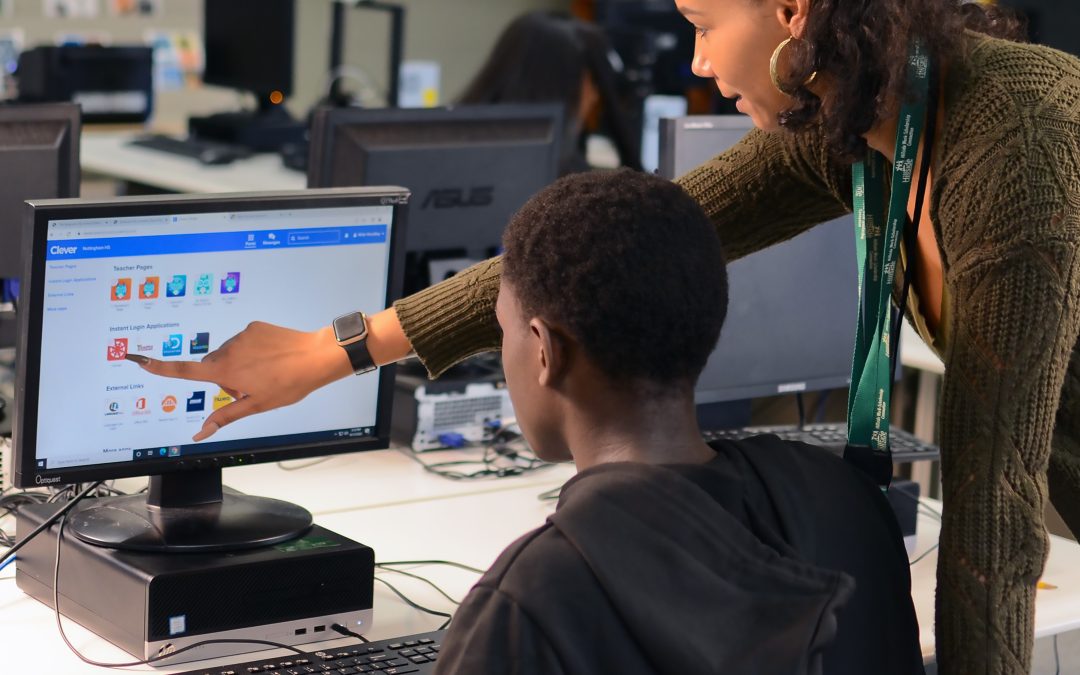This story originally appeared in Hillside’s 2022 Impact Report. Read the complete Report here.
* * *
Hillside’s path forward includes wide-ranging programs and initiatives that are shaping the future of the agency and its role in the communities we serve.
“The needs of youth and families are ever-changing, and Hillside must always grow and develop to meet those needs,” says Maria Cristalli, President and Chief Executive Officer. “The willingness to adapt is what has kept Hillside dynamic and strong for 185 years. It’s exciting to consider what the future will bring—and the many ways in which we’re preparing for that future today.”
Three of these priorities are notable not only for their specifics, but also as examples of larger trends that will continue to evolve in the years to come.
* * *
ADVANCED CARE, IN THE COMMUNITY
The key to Youth ACT is right there in its name: Assertive Community Treatment. The latest Hillside program, launched statewide last year by the New York State Office of Mental Health (OMH), provides intensive community-based services to support youth experiencing severe emotional disturbance—while avoiding the need for out-of-home treatment and other higher levels of care.
Youth ACT is a significant step in the development of programs that de-emphasize the need for residential treatment in the care of youth in crisis. “There will always be a need for some youth to receive treatment in a residential setting, but Youth ACT is designed to reduce that need,” says Elizabeth Nolan, Chief Operating Officer. “It provides many of the same aspects of residential treatment without requiring children to leave their homes and communities. When that’s possible, it’s better for them and for their families.”
“This program has already been a huge success here,” says Patricia Schaap, Deputy Director of Community Services with the Department of Mental Health in Cortland County.
Since the program was launched, Schaap says, youth whose emotional and behavioral issues had previously required “many, many” emergency interventions are now working with their families on stabilization in their homes. “To my knowledge they haven’t been back to the emergency room,” she observes.
Hillside is the only New York State provider authorized by OMH to provide Youth ACT services in three regions: Monroe County; Cortland and Chenango counties; and Steuben and Chemung counties.
“Our partnership with Hillside has been invaluable in Cortland County,” Schaap adds. “The team is doing wonderful work.”
* * *
THE DE&I COMMITMENT
Beyond programmatic changes, a more fundamental shift is also occurring at Hillside. In recent years, initiatives dedicated to Diversity, Equity & Inclusion (DE&I) have enhanced the agency as a service provider, a community partner, and one of New York State’s largest employers.
“These issues can’t be ignored in today’s society,” says Howard Cotton, interim Director of DE&I. “They’re deeply relevant to Hillside’s work, and to achieving the best possible outcomes with those we serve.”
Today, Hillside’s regional DE&I committees hold monthly talks on topics including systemic racism, white fragility and how issues of race can impact service delivery. An executive council assesses their recommendations while setting an agency-wide DE&I agenda. Affinity groups meet regularly to share unique perspectives among Hillside’s men and women of color. Trainings from internal leaders and visiting speakers further expand staff awareness of vital issues; and a leadership development program is fostering advancement among employees of color.
External partnerships are another focus. By engaging in regional conferences and seminars and participating in Pride events, staff and leaders strengthen community connections and affirm Hillside’s role as a champion of issues related to DE&I.
Monica Monte, a member of the Hillside Board of Governors and a partner with True Insights Consulting, which advises companies nationally on DE&I strategies, praises Hillside’s “authentic commitment.”
“They’re putting things into action and ensuring teams feel engaged and empowered, even when that’s not always the simplest path,” Monte says. “Hillside has intentionality. That is essential to achieving results.”
Cristalli notes that Hillside’s DE&I goals are aligned and integrated into Hillside’s strategy. “In partnership with our staff, families and community organizations, we are taking concrete steps to create more equitable futures for those we serve. As an organization, we celebrate our progress and recognize much more needs to be done.”
* * *
BRIDGING THE DIGITAL DIVIDE
The COVID-19 pandemic exposed the urgency of a specific form of community-facing inequity—and addressing it, Hillside knew, would require significant community support.
During the worst days of the pandemic, as students everywhere were forced to complete their schoolwork remotely, the lack of digital access in many homes created serious concerns. Nationwide, digital inequity disproportionately affects families of color and those who are living in poverty—and Syracuse, where nearly a quarter of residents have no Internet access, is known to be among the hardest-hit American cities in this issue.
At Hillside Work-Scholarship Connection’s Solace Campus in Syracuse, solutions were needed to support participating youth facing this problem. That need continues today, and a $25,000 gift from Northwestern Mutual is helping to upgrade the site’s technology infrastructure and significantly increase digital access at that site.
“A huge number of families have no access to technology that’s really necessary today,” says Paul Dodd, Managing Partner at Northwestern Mutual. “Helping these families can have a major impact in our community.”
More investment is still needed, and Hillside is pursuing additional partnerships in Syracuse and other communities where this and other problems exist. Cindy Odom, Chief Advancement Officer, cites the initiative as an example of the vital role played by philanthropy in making Hillside’s innovative ideas a reality.
“Traditional funding sources just don’t cover investments like this,” Odom says. “We’re grateful to Northwestern Mutual for their support, and we’re eager to develop more partnerships that allow our work to continue.”
Dodd agrees: “More people should know about this issue—it deserves attention from people in a position to help.”
* * *
Robust community support is needed to help these and other Hillside priorities achieve their full potential. Support our mission with a donation to Hillside today.



